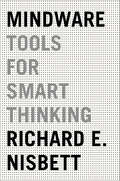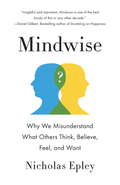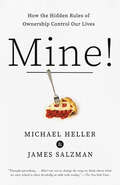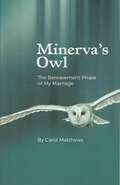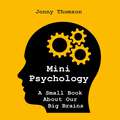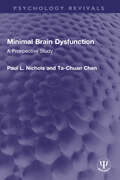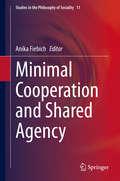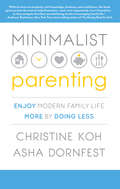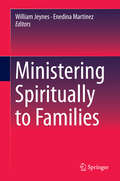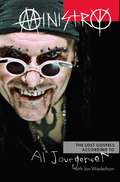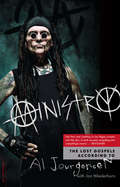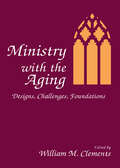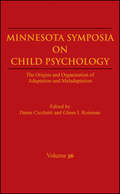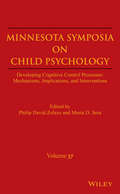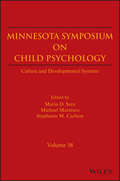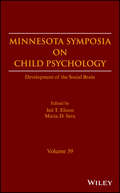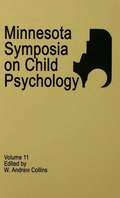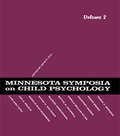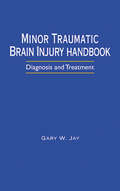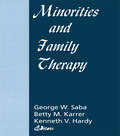- Table View
- List View
Mindware: Tools for Smart Thinking
by Richard E. NisbettAn accessible guide to essential tools of reasoning that can help you make better decisions in your daily life.Scientific and philosophical concepts can change the way we solve problems by helping us to think more effectively about our behavior and our world. Surprisingly, despite their utility, many of these tools remain unknown to most of us.In Mindware, the world-renowned psychologist Richard E. Nisbett presents these ideas in clear and accessible detail. Nisbett has made a distinguished career of studying and teaching such powerful problem-solving concepts as the law of large numbers, statistical regression, cost-benefit analysis, sunk costs and opportunity costs, and causation and correlation, probing the best methods for teaching others how to use them effectively in their daily lives. In this groundbreaking book, Nisbett shows us how to frame common problems in such a way that these scientific and statistical principles can be applied to them. The result is an enlightening and practical guide to the most essential tools of reasoning ever developed—tools that can easily be used to make better professional, business, and personal decisions.Praise for Mindware“Compelling . . . With clear explanations of relevant principles from statistics, formal logic, economics, and psychology, Nisbett does indeed assemble a powerful toolkit for examining the validity of claims made by marketers, politicians, and scientists. Just as important, he encourages us to turn these tools inward and test the legitimacy of our own easily swayed opinions and beliefs.” —The Boston Globe“[Mindware] is friendly and practical and aimed squarely at the lay reader. [Nisbett] sees his book as rather like a crash course in making better decisions and learning what scientifically proven theory to apply to which problem, enabling the reader to “perceive the world more accurately and behave more sensibly.”“—The Sunday Times (UK)
Mindwise
by Nicholas EpleyYou are a mind reader, born with an extraordinary ability to understand what others think, feel, believe, want, and know. It's a sixth sense you use every day, in every personal and professional relationship you have. At its best, this ability allows you to achieve the most important goal in almost any life: connecting, deeply and intimately and honestly, to other human beings. At its worst, it is a source of misunderstanding and unnecessary conflict, leading to damaged relationships and broken dreams. How good are you at knowing the minds of others? How well can you guess what others think of you, know who really likes you, or tell when someone is lying? How well do you really understand the minds of those closest to you, from your spouse to your kids to your best friends? Do you really know what your coworkers, employees, competitors, or clients want?In this illuminating exploration of one of the great mysteries of the human mind, University of Chicago psychologist Nicholas Epley introduces us to what scientists have learned about our ability to understand the most complicated puzzle on the planet--other people--and the surprising mistakes we so routinely make. Why are we sometimes blind to the minds of others, treating them like objects or animals? Why do we sometimes talk to our cars, or the stars, as if there is a mind that can hear us? Why do we so routinely believe that others think, feel, and want what we do when, in fact, they do not? And why do we believe we understand our spouses, family, and friends so much better than we actually do? Mindwise will not turn other people into open books, but it will give you the wisdom to revolutionize how you think about them--and yourself. From the Hardcover edition.
Mindwise
by Nicholas EpleyYou are a mind reader, born with an extraordinary ability to understand what others think, feel, believe, want, and know. It's a sixth sense you use every day, in every personal and professional relationship you have. At its best, this ability allows you to achieve the most important goal in almost any life: connecting, deeply and intimately and honestly, to other human beings. At its worst, it is a source of misunderstanding and unnecessary conflict, leading to damaged relationships and broken dreams. How good are you at knowing the minds of others? How well can you guess what others think of you, know who really likes you, or tell when someone is lying? How well do you really understand the minds of those closest to you, from your spouse to your kids to your best friends? Do you really know what your coworkers, employees, competitors, or clients want?In this illuminating exploration of one of the great mysteries of the human mind, University of Chicago psychologist Nicholas Epley introduces us to what scientists have learned about our ability to understand the most complicated puzzle on the planet--other people--and the surprising mistakes we so routinely make. Why are we sometimes blind to the minds of others, treating them like objects or animals? Why do we sometimes talk to our cars, or the stars, as if there is a mind that can hear us? Why do we so routinely believe that others think, feel, and want what we do when, in fact, they do not? And why do we believe we understand our spouses, family, and friends so much better than we actually do? Mindwise will not turn other people into open books, but it will give you the wisdom to revolutionize how you think about them--and yourself. From the Hardcover edition.
Mindwise
by Nicholas EpleyYou are a mind reader, born with an extraordinary ability to understand what others think, feel, believe, want, and know. It's a sixth sense you use every day, in every personal and professional relationship you have. At its best, this ability allows you to achieve the most important goal in almost any life: connecting, deeply and intimately and honestly, to other human beings. At its worst, it is a source of misunderstanding and unnecessary conflict, leading to damaged relationships and broken dreams. How good are you at knowing the minds of others? How well can you guess what others think of you, know who really likes you, or tell when someone is lying? How well do you really understand the minds of those closest to you, from your spouse to your kids to your best friends? Do you really know what your coworkers, employees, competitors, or clients want?In this illuminating exploration of one of the great mysteries of the human mind, University of Chicago psychologist Nicholas Epley introduces us to what scientists have learned about our ability to understand the most complicated puzzle on the planet--other people--and the surprising mistakes we so routinely make. Why are we sometimes blind to the minds of others, treating them like objects or animals? Why do we sometimes talk to our cars, or the stars, as if there is a mind that can hear us? Why do we so routinely believe that others think, feel, and want what we do when, in fact, they do not? And why do we believe we understand our spouses, family, and friends so much better than we actually do? Mindwise will not turn other people into open books, but it will give you the wisdom to revolutionize how you think about them--and yourself. From the Hardcover edition.
Mindwise
by Nicholas EpleyYou are a mind reader, born with an extraordinary ability to understand what others think, feel, believe, want, and know. It's a sixth sense you use every day, in every personal and professional relationship you have. At its best, this ability allows you to achieve the most important goal in almost any life: connecting, deeply and intimately and honestly, to other human beings. At its worst, it is a source of misunderstanding and unnecessary conflict, leading to damaged relationships and broken dreams. How good are you at knowing the minds of others? How well can you guess what others think of you, know who really likes you, or tell when someone is lying? How well do you really understand the minds of those closest to you, from your spouse to your kids to your best friends? Do you really know what your coworkers, employees, competitors, or clients want? In this illuminating exploration of one of the great mysteries of the human mind, University of Chicago psychologist Nicholas Epley introduces us to what scientists have learned about our ability to understand the most complicated puzzle on the planet--other people--and the surprising mistakes we so routinely make. Why are we sometimes blind to the minds of others, treating them like objects or animals? Why do we sometimes talk to our cars, or the stars, as if there is a mind that can hear us? Why do we so routinely believe that others think, feel, and want what we do when, in fact, they do not? And why do we believe we understand our spouses, family, and friends so much better than we actually do? Mindwise will not turn other people into open books, but it will give you the wisdom to revolutionize how you think about them--and yourself. From the Hardcover edition.
Mine!: How the Hidden Rules of Ownership Control Our Lives
by James Salzman Michael A. HellerA hidden set of rules governs who owns what--explaining everything from whether you can recline your airplane seat to why HBO lets you borrow a password illegally--and in this lively and entertaining guide, two acclaimed law professors reveal how things become "mine.""Mine" is one of the first words babies learn. By the time we grow up, the idea of ownership seems natural, whether buying a cup of coffee or a house. But who controls the space behind your airplane seat: you reclining or the squished laptop user behind? Why is plagiarism wrong, but it's okay to knock-off a recipe or a dress design? And after a snowstorm, why does a chair in the street hold your parking space in Chicago, but in New York you lose the space and the chair?Mine! explains these puzzles and many more. Surprisingly, there are just six simple stories that everyone uses to claim everything. Owners choose the story that steers us to do what they want. But we can always pick a different story. This is true not just for airplane seats, but also for battles over digital privacy, climate change, and wealth inequality. As Michael Heller and James Salzman show--in the spirited style of Freakonomics, Nudge, and Predictably Irrational--ownership is always up for grabs.With stories that are eye-opening, mind-bending, and sometimes infuriating, Mine! reveals the rules of ownership that secretly control our lives.
Minerva's Owl: The Bereavement Phase of My Marriage
by Carol Matthews"Of the numerous books that have been written about loss, Matthews has given us an original, startling and deeply thought-provoking work. . . What we are left with is a sense of peace -- the kind that comes with the knowledge that, even in the darkest places, we are not alone." -- Eve Joseph, author of In the Slender MarginMinerva's Owl is a memoir that celebrates marriage and explores bereavement a stage of married love. It includes literary references, conversations, letters and memories that are framed in six sections: grieving, longing, belonging, mourning, cleaving and, ultimately, surviving. It does not offer easy answers or a step-by-step guide to grief -- rather, Minerva's Owl provides an unforgettable account of great love and loss.
Mini Psychology: A Small Book About Our Big Brains
by Jonny Thomson'The most comprehensive - and delightful - guide to the human mind.' STEPHANIE HARRISON'This little book would persuade you that psychology is not just fun but hugely important.' PROFESSOR GEOFF BEATIEWhy do people stay in unhappy relationships?What are the six tricks for successful persuasion?Can personality traits predict future criminality?And what can pigeons tell us about superstitious behaviour?Whether you're a student of psychology or you're just interested in the workings of the brain, Mini Psychology offers a window onto the fascinating mysteries of the human psyche, covering everything from how our memories are formed to why some people are so resistant to change.Focusing on the curious stories behind the abstract theories, it explains the major ideas and names you need to know - and invites you to shine a light on your own inner life.More praise for Jonny Thomson:'Witty, knowledgeable and mind-expanding' RICHARD FISHER 'Engaging, smart and wise' DAVID MITCHELL'A fun and inspiring teaser for curious minds' JÉRÉMIE HARRIS
Mini Psychology: A Small Book About Our Big Brains
by Jonny Thomson'The most comprehensive - and delightful - guide to the human mind.' STEPHANIE HARRISON'This little book would persuade you that psychology is not just fun but hugely important.' PROFESSOR GEOFF BEATIEWhy do people stay in unhappy relationships?What are the six tricks for successful persuasion?Can personality traits predict future criminality?And what can pigeons tell us about superstitious behaviour?Whether you're a student of psychology or you're just interested in the workings of the brain, Mini Psychology offers a window onto the fascinating mysteries of the human psyche, covering everything from how our memories are formed to why some people are so resistant to change.Focusing on the curious stories behind the abstract theories, it explains the major ideas and names you need to know - and invites you to shine a light on your own inner life.More praise for Jonny Thomson:'Witty, knowledgeable and mind-expanding' RICHARD FISHER 'Engaging, smart and wise' DAVID MITCHELL'A fun and inspiring teaser for curious minds' JÉRÉMIE HARRIS
Mini Psychology: A Small Book About Our Big Brains
by Jonny Thomson'The most comprehensive - and delightful - guide to the human mind.' STEPHANIE HARRISON'This little book would persuade you that psychology is not just fun but hugely important.' PROFESSOR GEOFF BEATIEWhy do people stay in unhappy relationships?What are the six tricks for successful persuasion?Can personality traits predict future criminality?And what can pigeons tell us about superstitious behaviour?Whether you're a student of psychology or you're just interested in the workings of the brain, Mini Psychology offers a window onto the fascinating mysteries of the human psyche, covering everything from how our memories are formed to why some people are so resistant to change.Focusing on the curious stories behind the abstract theories, it explains the major ideas and names you need to know - and invites you to shine a light on your own inner life.More praise for Jonny Thomson:'Witty, knowledgeable and mind-expanding' RICHARD FISHER 'Engaging, smart and wise' DAVID MITCHELL'A fun and inspiring teaser for curious minds' JÉRÉMIE HARRIS
Minimal Brain Dysfunction: A Prospective Study (Psychology Revivals)
by Paul L. Nichols Ta-Chuan ChenThe concept of Minimal Brain Dysfunction (a previous term for ADHD) has had a tumultuous, and some would say, checkered history. Originally published in 1981, this title was one of a series of volumes dealing with specific developmental problems in children whose mothers registered for prenatal care in the Collaborative Perinatal Project (NCPP) of the National Institute of Neurological and Communicative Disorders and Stroke (NINCDS). In this volume, relationships between symptoms of minimal brain dysfunction and more than 300 prenatal and postnatal variables are examined in a cohort of nearly 30,000 7-year-old children. Despite greater understanding more recently, diagnosis and treatment continue to cause controversy. This is an early investigation into the concept of MBD and its causes, today it can be read in its historical context.
Minimal Cooperation and Shared Agency (Studies in the Philosophy of Sociality #11)
by Anika FiebichThis volume examines minimality in cooperation and shared agency from various angles. It features essays written by top scholars in the philosophy of mind and action. Taken together, the essays provide a genuine contribution to the contemporary joint action debate.The main accounts in this debate present sufficient rather than necessary or minimal criteria for there to be cooperation. Much discussion in the debate deals with robust rather than more attenuate and simple cases of cooperation or shared agency. Focusing on such minimal cases, however, may help to explain how cooperation comes into existence and how minimal cooperation interrelates with more complex cases of cooperation. The contributors discuss minimality in cooperation by focusing on particular aspects. For example, they consider how social roles might deliver minimal cooperation constraints or what the minimal contextual criteria are for cooperation to emerge.Readers will find the answers to these and other questions: What is minimally cooperative behavior? By what steps could full members of a society organized by conventions, norms and institutions be constructed from creatures with minimal social skills and cognitive abilities? What do we experience of actions when we act together with a purpose?
Minimalist Parenting: Enjoy Modern Family Life More by Doing Less
by Asha Dornfest Christine K. KohWe're in the midst of a parenting climate that feeds on more. More expert advice, more gear, more fear about competition and safety, and more choices to make about education, nutrition, even entertainment. The result? Overwhelmed, confused parents and overscheduled, overparented kids. In MINIMALIST PARENTING, Christine Koh and Asha Dornfest offer a fresh approach to navigating all of this conflicting background "noise." They show how to tune into your family's unique values and priorities and confidently identify the activities, stuff, information, and people that truly merit space in your life. The book begins by showing the value of a minimalist approach, backed by the authors' personal experience practicing it. It then leads parents through practical strategies for managing time, decluttering the home space, simplifying mealtimes, streamlining recreation, and prioritizing self-care. Filled with parents' personal stories, readers will come away with a unique plan for a simpler life.
Ministering Spiritually to Families
by William Jeynes Enedina MartinezThis book combines the research on spiritual ministering with the practice of counseling families. It examines such topics as how to prepare for marriage, how to keep a marriage divorce proof, and how parents influence children, and vice versa. In its quest to discover what makes families thrive, the book addresses and compares best parenting practices and describes interventions that help the development of family ties over a large span of the life-course. It offers guidance to families through several stages of family life: Pre-marital, marital, and raising children and adolescents. It makes clear that what constitutes an effective parent changes over the life course.
Ministry
by Al JourgensenThe high-octane, no-holds-barred memoir by legendary godfather of industrial musicOCoAl Jourgensen, the founder of Ministry"
Ministry
by Al JourgensenThe high-octane, no-holds-barred memoir by legendary godfather of industrial musicOCoAl Jourgensen, the founder of Ministry"
Ministry With the Aging: Designs, Challenges, Foundations
by William M ClementsMinistry With the Aging--the one most frequently used textbook in seminary courses that deal with ministry and aging--is now available from The Haworth Press. Here is a genuinely useful and informative text in which an all-star cast of authors reflects on the current situation of the aged in our society. Ministry With the Aging encourages a deeper appreciation of the presence and role of aging people with contemporary religion, addresses the challenges that the church and society face in a rapidly aging society, and provides practical applications for an effective ministry with the aging. Each chapter, whether it focuses on the role of the elderly in the early church, death and dying, ageism, retirement, or caring for elderly parents, is written by an eminent scholar who has chosen only the most relevant issues for discussion. A past runner up for the “Book of the Year Award” by the Academy of Parish Clergy, Ministry With the Aging is a landmark volume that can offer theology students a unique and insightful look at how they can best meet the needs of their elderly parishioners.
Minnesota Symposia on Child Psychology
by Dante Cicchetti Glenn I RoismanThe Origins and Organization of Adaptation and Maladaptation provides scholars, students, and practitioners with access to the newest work of top tier scientists in psychology. This volume addresses issues relevant to the impact of attachment on romantic relationships in later adulthood. In addition, it explores cutting-edge issues in the field, heralding critical up-and-coming areas of scholarship. Academic researchers in developmental psychology, as well as developmental psychopathology will look forward to this volume.
Minnesota Symposia on Child Psychology
by Maria Sera Philip David ZelazoThe collected papers from the most prestigious symposia in the field of child development provide scholars, students, and practitioners with access to the work of key researchers in human development. This volume focuses on changes in our understanding of cogisnitive control processes--constructs important to the field since Wundt and Freud. Our understanding of these constructs has advanced dramatically in recent years--both empirically and conceptually. This collection brings generalists and specialists alike up-to-date on this central process of human development and the implications for this new knowledge on school success and other areas.
Minnesota Symposia on Child Psychology, Volume 38: Culture and Developmental Systems
by Michael Maratsos Stephanie M. Carlson Maria D. SeraNow in its 38th volume, Sera's Minnesota Symposium on Child Psychology: Culture and Developmental Systems contains the collected papers from the most prestigious symposia in the field of child development and provides scholars, students, and practitioners with access to the work of key researchers in human development. Our understanding of this field has advanced dramatically in recent years--both empirically and conceptually. This collection brings generalists and specialists alike up-to-date on this central process of human development and the implications for this new knowledge on school success and other areas.
Minnesota Symposia on Child Psychology: Development of the Social Brain (The Minnesota Symposia on Child Psychology)
by Maria D. Sera Jed T. ElisonSocial relationships play a central role in the evolution and development of human culture and cognition. Volume 39 of the Minnesota Symposium on Child Psychology (Development of the Social Brain) adresses the ontogeny and phylogeny of the social brain from multiple perspectives and levels of analysis. The chapters in this volume shed light on shared versus unique features of social information processing across different species, and sketch out some of the cognitive and neural mechanisms that underlie such processing. A collection of chapters from distinguished contibutors offer new insights into the unique nature of human development.Flexibly and efficiently navigating the complex dynamics of social interaction remains one of the remarkable achievements of human evolution. As life in social contexts evolved, so did information processing abilities that afforded new ways of interacting with others, emerging into what we now refer to as cultural cognition or cultural practices. The primary objective of the current volume was to consider phylogenetic and ontogenetic influence on specialized social information processing capactities. The volume brings together, for the first time, distinguished research scholars to consider central themes and principles associated with the development of the social brain. Readers will take away a fresh perspective on nature of human nature.
Minnesota Symposia on Child Psychology: Volume 11 (Minnesota Symposia on Child Psychology Series #Vol. 21)
by W. Andrew CollinsPublished in 1978, Minnesota Symposia on Child Psychology is a valuable contribution to the field of Developmental Psychology.
Minnesota Symposia on Child Psychology: Volume 2 (Minnesota Symposia on Child Psychology Series)
by John P. HillFirst published in 1981. Routledge is an imprint of Taylor & Francis, an informa company.
Minor Traumatic Brain Injury Handbook: Diagnosis and Treatment
by Gary W. JayAlmost two million individuals experience minor traumatic brain injury (MTBI/MATBI) each year. Patients from all over the country have similar - even identical - complaints from comparable types of trauma. Unfortunately, the vast majority of medical professionals do not recognize or understand the appearance, etiology, or problems associated with M
Minorities and Family Therapy
by Kenneth Hardy Betty Mackune-Karrer George SabaMinorities and Family Therapy highlights the work of experienced, sensitive clinicians who, along with minority families, have found creative solutions to the problems minority families present. Until now, the field of family therapy has paid little attention to the specific clinical needs and strengths of minority families. Without sufficient exploration and training, family therapists risk treating minority families from a narrow, incomplete perspective, filtering out their inner resources, values, legacies, history, and wisdom, and underestimating the influence of the social settings in which they live. This unique and highly valuable book explores how systems-oriented clinicians presently work with ethnic and racial minority families. The chapters cover a wide range of clinical issues including pitfalls of misunderstanding and discrimination, innovative strategies for treating drug abuse and AIDS, and skills needed in caring for particular minority groups, such as Native Americans, blacks, Latinos, and Asian Americans. The authors go beyond simply spelling out cultural similarities and differences. They provide clear, clinical suggestions to be applied in family and community contexts. Not just another book on ethnicity, Minorities and Family Therapy looks at families who, because of their race and cultural background, have had to struggle with racism, discrimination, limited access to health care, economic bankruptcy, and educational barriers. Written for family therapists and health care providers who work with minority families and look for creative alternatives to improve their care, this landmark volume is a celebration of the strengths that minority families demonstrate in coping with long-term adversity.
